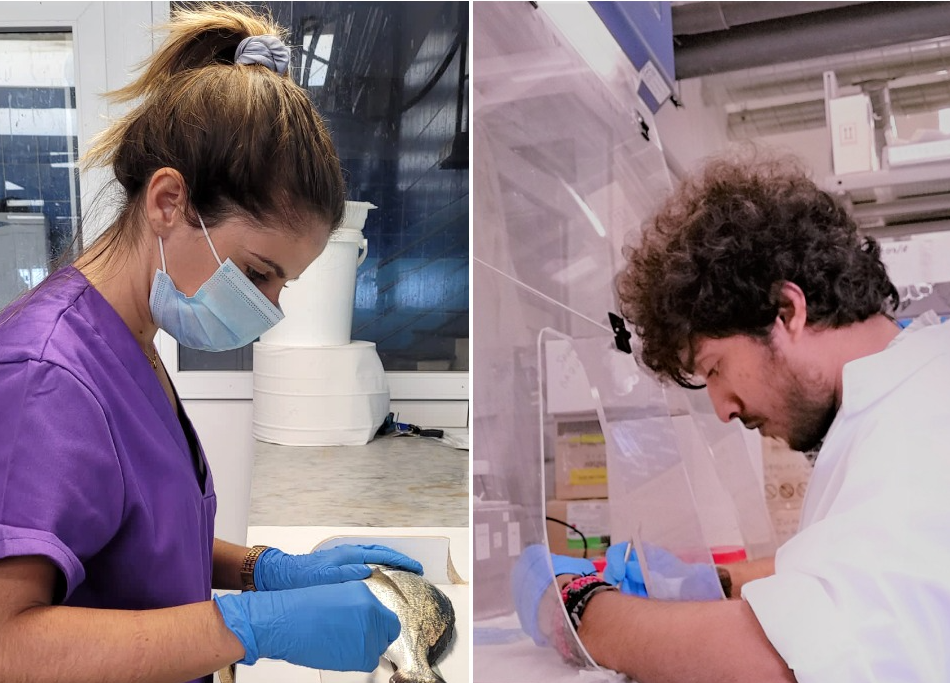The work of the PhD students from ULPGC Marta Carvalho and Sivagurunathan Ulaganathan was highly valuated by the Scientific Committee of the last International Symposium on Fish Nutrition and Feeding
The work of the PhD students from ULPGC Marta Carvalho and Sivagurunathan Ulaganathan was highly valuated by the Scientific Committee of the last International Symposium on Fish Nutrition and Feeding.
Marta Carvalho and Sivagurunathan Ulaganathan, PhD students from the Aquaculture Research Group of the University Institute of Sustainable Aquaculture and Marine Ecosystems (ECOAQUA) of the University of Las Palmas de Gran Canaria (ULPGC), won the awards for best oral presentation and best poster, respectively, at the International Symposium on Fish Nutrition and Feeding (ISFNF) celebrated in Busan, Korea, between 12th and 16th December 2021.
The work presented by Marta Carvalho with the title 'Microalgal products as innovative sources of omega-3 fatty acids in aquafeeds: implications for fish production, consumers and industry sustainability', was developed in the framework of the European project PerformFISH, and summarises all the results of her doctoral thesis developed over the last 4 years, under the supervision of ther professors Marisol Izquierdo and Daniel Montero.
This year, the Portuguese researcher had also won the "Women in Aquaculture" grant awarded by the Norwegian company Kvarøy Arctic, one of the world's largest producers of Atlantic salmon.
Carvalho is specializing in the research of new ingredients for aquaculture feed industry, that will improve the sustainable and efficient development of aquaculture industry to maximize the growth, health and welfare of aquaculture fish species. One of the specific objectives of her research has been to study new sources of omega-3s for these feeds, particularly of EPA and DHA, that are extremely important for both fish and humans. Thus, the purpose of her research is to highlight new omega-3 rich-ingredients to increase production efficiency and the omega-3 content in the aquaculture product that reach the consumer, and consequently, able to improve the health benefits associated to fish consumption for humans.
Sivagurunathan Ulaganathan, from India, won the best poster presentation award at this year's ISFNF for his study on 'Dietary requirements of vitamin D3 and vitamin K3 in sea bream (Sparus aurata) larvae in relation to growth and gene expression of bone biomarkers'. Ulaganathan is working on his doctoral thesis linked to the European Biomedaqu project, which is funded by the Marie Sklodowska-Curie Innovative Training Networks (MCSA-ITN), under the direction of ULPGC professor Marisol Izquierdo and the researcher David Domínguez.
In this presentation, Sivagurunathan Ulaganathan showed that dietary supplementation of vitamin D3 and vitamin K3 improves growth and reduces the incidence of bone abnormalities in sea bream larvae by regulating vitamin K dependent proteins, such as osteocalcin (oc) and matriz-gla protein (MGP), as well as the calcium regulatory genes.
Sivagurunathan is currently determining the level of inclusion of these nutrients in larval feeds to improve growth, survival and overcome skeletal abnormalities in marine fish larvae. Inclusion of these vitamins in feed would lead to an increase in aquaculture production, contributing to overall economic improvement.
The ISFNF, one of the most important events in the international aquaculture sector, brings together researchers, industry, government institutions and other stakeholders every two years to identify and address constraints limiting aquaculture production, farmed organism health and food security, in order to recognize the need for approaches based on new knowledge, emerging technology and new ideas. Due to the pandemic, the 2020 meeting was postponed to December 2021, but a new conference is already scheduled for June 2022.
The main objectives of the International Symposium on Fish Nutrition and Feeding are to promote the advancement of fish and crustacean nutrition science, research and development through international cooperation at a global level, to foster communication and collaboration among nutrition scientists, as well as to disseminate information in aquatic nutrition sciences through modern communication technology.


